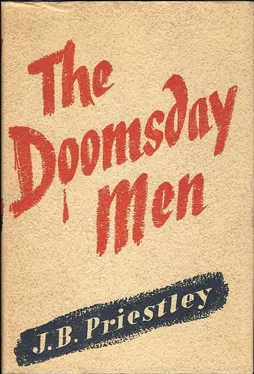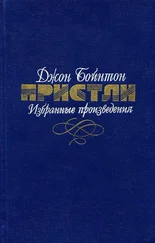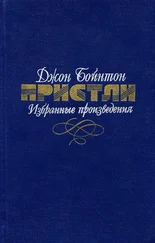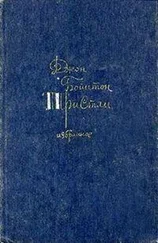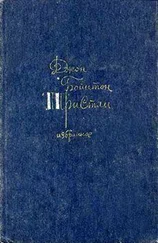A little white-jacketed brown servant appeared, to say that Mr. Paul wished to speak to Mr. Henry at once in the tower. At the door, Henry MacMichael turned and looked again at Malcolm. “Or I’ll shoot you myself. And don’t take that as a joke, because it isn’t one.”
Left to themselves, the lovers looked at one another with pride and joy and moved out again on to the balcony, entirely forgetting for the moment that the world might be coming to an end.
In another part of the house, in a small room, closely-curtained, hung about with mysterious signs and symbols, a room that had nothing to do with the American South-West and the Twentieth Century, Jimmy Edlin stood and glared at the other MacMichael brother, known to his followers as Father John. They were alone; though Jimmy had a shrewd notion that the bleached young man who had brought him along here had only retired to the other side of the door, where he waited, with his gun handy.
John MacMichael was a man about Jimmy’s own age, but there all likeness ended. He was dark, and his longish hair, with one lock falling across his right temple, was streaked with grey. His nose was rather long and pointed. His face had the dull flabby look of those who spend too much time indoors. He was a naturally slender and small-boned man now rapidly putting on unhealthy weight. He wore a dark-blue kind of blouse. His hands, Jimmy noticed, were quite unusually small, with the thin pointed little fingers of a woman. But his eyes were more remarkable; they were much lighter than his hair and eyebrows, almost yellow; and they had a strange blind look, as if they were not used to observe the world but only to see with in dreams and visions. They made Jimmy feel as if he were not quite there, solid and real, standing in front of them. On the other hand, a great many other things, invisible to him, were there, he felt, to those eyes.
“Kaydick reports,” John was saying, in a small precise voice, “that you had information that could only have been given you by one of our servers, who are bound by a solemn oath of secrecy. It is necessary for me to know which of them it was who broke that oath, so that I may pray and demand his eternal damnation. And do not foolishly imagine we have neither the means nor the will to make you speak. We are the instruments of the divine vengeance.”
Determined as he was to put on a brave front and to take this opportunity of telling Father John what he thought of his murderous Brotherhood, Jimmy could not avoid feeling the cold grasp of fear as he heard these words, which reminded him unpleasantly of what Kaydick had said, that afternoon at the ranch. They had the same cool, considered and total inhumanity. Jimmy felt that if ants or spiders could make speeches, they might be in a similar vein to this. No ordinary human contact at all. It was like trying to have a chat somewhere on the moon.
“I can soon settle that,” said Jimmy hoarsely. “The information I had-the password about the clock striking, and all that-I didn’t get from any of your fellows. It came from my brother.”
“And who and where is your brother?” the other enquired softly.
“He’s dead,” cried Jimmy, more boldly now. “He was found murdered in the back room of a little cafe down-town in Los Angeles. Yes, and the people who killed him were these big-nosed retired farmers and tight-mouthed warehouse hands that you’ve roped in and talked out of their senses. And don’t tell me that you-a man of your education and position-really believe this old-fashioned Bible-belt dope you’ve handed out to these poor brainless louts. I went to a meeting, and know what the stuff’s like. And it wouldn’t go down any longer even in a tent in Arkansas. If you ask me, you’re not even an honest fanatic.”
John MacMichael smiled, but only with his mouth, not with those yellow blind eyes. “You are wrong. I have an honesty that you have never dreamed of. But the people must be taught according to the reach and grasp of their understanding. That was always the way, and in this our time is no different from other times. What matters is not what the intellect can perceive but in what the soul may believe and rest. As for your brother, he died not because we delight in the shedding of blood, but because the divine spirit has its plan and chooses its instruments and workmen. Across the road by which you came here to-night, some little creature of the desert, perhaps a rat trying to return to its nest, may have scurried, only to be crushed by one of the wheels, set in motion by a plan, a scheme of things, far away from and unknown to the little creature. So your brother died; and so too, very soon, may you, and indeed all of us die in this corrupt body, a little of which dies every moment.”
“But God’s truth!” cried Jimmy, exasperated by this calm dismissal of downright murder, this lofty disdain of all ordinary human values, “who are you to talk as if you were God’s right-hand man, in all His secrets?”
“Who am I?” He smiled again, then his strange eyes seemed to contract and his tone grew sharper. “I am the one who has listened and so has heard, who has looked and seen, who has asked through hours and hours of silence for a command and has at last received it. You have travelled far. I know that, you see, though you are a stranger to me. I have some powers almost lost now in this Western world. So, you have travelled. What would you say if you were describing the distant places you have seen to a man whom you knew had never left his village, and he refused to listen, denied your knowledge, and asked who you were to talk as if you had seen all the earth?”
“That’s not the same thing,” Jimmy growled, though he found himself oddly impressed. “Not the same thing at all-”
“It is. For I have spent my time travelling too, not along the surface of things, as you have, but penetrating them, moving into another world altogether, that of the enduring spirit. And what I have seen and heard there, what has been taught me, what I have received as a command, these give me the right to talk as if you were a child, which indeed you are-”
“I may be a child according to your twisted way of thinking,” cried Jimmy, with some violence, “but I happen to know the difference between right and wrong, and it’s my opinion you don’t any longer. You’ve spent so much of your time sitting by yourself in rooms like this, with everything shut out, just imagining things and talking to yourself, that you’ve got all mixed up, and fancy God’s talking to you-”
“Be quiet,” the other commanded sharply, not because he did not want to hear any more from Jimmy, though there were distinct signs of that too, but because the house telephone on the table beside him was now ringing. “Yes, Paul,” he replied, and then as he listened to what followed his face lit up and the strange yellow eyes seemed to glow.
“And whatever this is,” Jimmy thought grimly, “I’ll bet it’s damned bad news for everybody but this gang of loonies.”
“You see, Paul,” John was saying, “that is how I told you it would be. I knew.” He was triumphant. Then he listened again, frowning a little. “But why such haste?” he enquired, at length. “You are certain? Well, that’s your concern. But I will send out the messages to-night, and tell Kaydick to summon all who can make the journey out here. There’s one thing more. We’ve no time now to do as we planned originally, to justify ourselves before the world. Yes, too dangerous now, you may be right. But I still feel compelled towards that justification, and there is at least one man here, with me in this room now, and you have another with you, I think, and we may take these to represent that world. . . . Yes, later, of course. . . .”
Jimmy stared and listened hard, and suddenly found himself in a sweat of anxious bewilderment. It was the triumphant tone and look, and above all the wild visions flaring in those eyes, that frightened him. What in the name of hell-fire was brewing here?
Читать дальше
